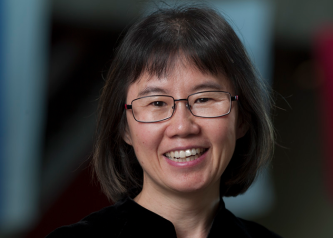

Louis Block Distinguished Service Professor, Department of Physics, Enrico Fermi Institute, and the College; Senior Advisor to the Provost for Global Scientific Initiatives
Young-Kee Kim is an experimental particle physicist whose research aims to understand the origin of mass for fundamental particles. Specifically, she has studied the W boson and the top quark, two of the most massive known fundamental particles to date, and the Higgs boson that gives mass to fundamental particles. Kim was the first to make a direct top-quark lifetime measurement. She is PI of the accelerator research group at the University and will assume presidency of the American Physical Society in 2024. Kim is currently working on the ATLAS experiment through the Large Hadron Collider, the world’s largest and highest-energy particle collider housed at CERN in Switzerland. With about 3,000 researchers, the experiment is one of the largest, international collaborative efforts in science. She co-led the CDF experiment through Fermilab’s Tevatron particle accelerator between 2004 and 2006, a collaboration consisting of 600 researchers from 60 institutions across 20 countries. From 2006 to 2013, she served as Deputy Director of Fermilab.
As Senior Advisor to the Provost for Global Scientific Initiatives, Kim advances the University’s global reach and reputation in the sciences and helps support the community of international scholars and students at the University. She also co-chairs the Physical Sciences Division’s Equity, Diversity, and Inclusion Coordination Team (EDICT) and works to advance the role of women and underrepresented groups in physics. She is a member of the National Academy of Sciences and the American Academy of Arts and Sciences.
Q&A:
Q: Why is international collaboration important in your field of study?
A: Scientific progress in my field of study, particle physics, heavily relies on large-scale particle accelerators and detectors which are international in scope. No individual country can design and build them alone, and international collaboration is essential.
Q: How has your work with international partners been beneficial to you and your career, specifically?
A: International collaboration fosters a different kind of curiosity, perspective, and learning and widens the access to a greater number of ideas and techniques used for my research. Through international collaboration, my research became more creative, deeper, and more agile, and I met so many amazing people from very diverse groups. I became a much better scientist and human being.